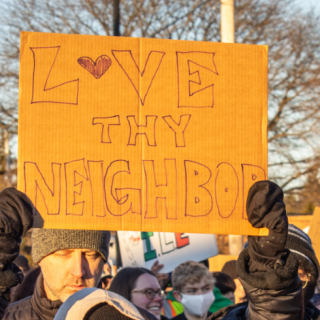I could begin by stating that the world, despite small and justified protests, is celebrating Emmanuel Macron’s recent victory in the French presidential election. On the surface, it would be an accurate statement. People across the world from Western Europe to the United States are writing and posting about Macron and his saving the continent. But the excitement is really over Marine Le Pen’s loss. The French, overall, didn’t want to be seen as racist and isolationist. The rest of the world didn’t want another Donald Trump in power. Amidst all the hubbub since the election, it would be easy to think Macron is a progressive warrior who ended racism and nationalism in one fell swoop. That description isn’t even remotely close to who he really is, and it is a shining example of the problem with people thinking about politics in relative, rather than absolute, terms.
To see why the world paid so much attention to the election, and why it is thrilled about the result, we need to first look at Macron’s opponent in the run-off, Marine Le Pen. Raised by a far-right Catholic father, Le Pen has spent her life surrounded by Holocaust deniers, climate change deniers, Nazis (actual Nazis; not people angry Americans deem unlikeable), and a whole mélange of other loathsome characters. On her way to the leadership of Front National, she gained political experience and notoriety by becoming a Member of the European Parliament and a councillor. It was in these roles that she honed her positions and began to move away from her father’s beliefs. Her presidential campaign was founded on just one of those positions; immigration. She called for an almost complete shutdown of all immigration, the expulsion of “illegal” immigrants, and the rescission of benefits from all non-citizens. With those ideas, and the reprehensible rhetoric that accompanied them, it was impossible for voters to even consider her other positions and view her as anything less than a French Donald Trump. No matter who ran against her, they would look positively progressive by comparison. Macron is the one who benefited from that reality.
Emmanuel Macron is a former investment banker who served as Minister for the Economy and Finance under François Hollande. He left the Socialist Party to become an independent before forming a new organization, En Marche!, for his presidential run. The group’s name is supposed to be “Onward!” but a perhaps more accurate translation (because of the underlying meaning, not linguistic purposes) is “Moving!” That would appropriately imply work will be done but it won’t necessarily result in progress or improvement. Macron, like most American major party candidates, promises change without any offer of progress.
In the middle of a slowing economy and 10.4% unemployment, he wants to slash
the business tax rate.
Change?: Oui. The tax rate will be lower than before.
Progress?: Non. There will be less money for investment in social programs and only the richest business owners will see any financial gain.
During a refugee catastrophe across the Middle East and Europe, he will increase investment in the military and intervene in Syria.
Change?: Oui. The armed forces will have more ways to kill people and more innocent people will die.
Progress?: Non. War is never a solution and, after thousands of years of death and destruction, it should be obsolete. The money spent on blowing up a nation could go into healthcare, education, environmental protections, etc.
After the Eurozone crisis and in the middle of widespread unhappiness with the EU’s current structure, he is pushing for a “stronger” Europe with the final goal likely being a federal United States of Europe.
Change?: Oui. The French and Germans will increase their control over the entire continent. The US, China, and India will only have to deal with one “country” on economic issues instead of multiple sovereign nations.
Progress?: Non. History shows us that a massive centralization of power will only lead to disaster. More and more decisions will be made for Europeans by officials they did not elect. Making trade a number one priority takes away focus from the issues that genuinely affect most people.
All of his other ideas are just as centrist and predictable. He will pay lip service to the poor while giving the rich tax breaks. He talks about human rights while discussing plans to bomb foreign countries. He lacks imagination and energy, qualities every voter in every country should cherish in their leader(s). Seeing his and Le Pen’s positions next to each other makes it easy to see why everyone is so happy he defeated her. He is the relatively superior choice. However, reading about Macron without thought for anybody else shows he is not a desirable selection. That’s what is both frustrating and confusing about the excitement.
Numerous world leaders have not only congratulated him, but enthusiastically praised him. Some Greens and independent progressives have posted about their happiness at his election. Even Human Rights Watch called Macron’s victory a win for “Rights, Respect, and Tolerance.” What about respect for the UK’s democratic decision to leave the EU? How about respect for the working class? Did HRW not think about the rights of innocent Syrians to live life without being bombed in their homes? Le Pen wants Muslims to stay in their own countries but Macron intends to kill them there. His win is actually a win for war. It is a win for economic policies that benefit only 1% of society. It is a win for power grabs and the end of European democracy. Would the group have been so quick to celebrate Macron’s win if he were running against a Jill Stein or Bernie Sanders-type individual? No, it wouldn’t, because Macron is not as bad as Marine Le Pen, but is worse than Stein and Sanders. Human Rights Watch is happy that a warmonger became president because the other candidate was so much worse. It is exactly that consideration of politicians in relative terms which leads voters to support people that do not represent their interests nor have any investment in social progress.
People will soon forget about Marine Le Pen and come to realize why Emmanuel Macron was such a bad choice. The perennial, jaded excuse “well, things could be much worse” will quickly and inevitably lead to “when will things get better?” The answer to that question depends on when voters start putting all their energy, resources, and support behind the progressive candidates, not the comparatively more progressive.
If they don’t, we can all forget about Liberté, Égalité, Fraternité. It will only be L’Argent, La Guerre, Le Pouvoir.



